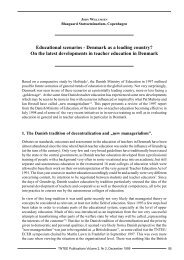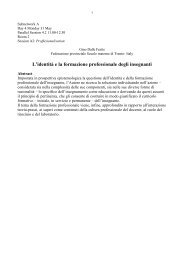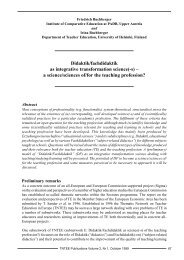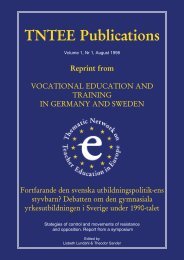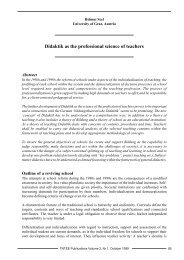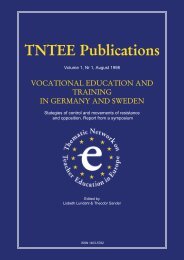TNTEE Publications - Didaktik/Fachdidaktik
TNTEE Publications - Didaktik/Fachdidaktik
TNTEE Publications - Didaktik/Fachdidaktik
Create successful ePaper yourself
Turn your PDF publications into a flip-book with our unique Google optimized e-Paper software.
of personal and professional development are seen to be inseparable. The importance of language<br />
and communication is stressed, as is a constructivist perspective on student learning. The overall<br />
approach to this development is based on the view that there is “a theoretical body of knowledge<br />
working as a common denominator across” all the subjects involved (science, mathematics and<br />
humanities). Action, whether a part of teaching or any other activity in life, is seen to be either<br />
linked with theory or otherwise “it is blind and purposeless”. Hence a theory of learning may be<br />
seen to function as an analytical tool in order to judge the quality of a particular teaching and<br />
learning event. A major aim of the methodology component is to help students to acquire a perspective<br />
on education based on “the achievement of autonomy, solidarity, ability for problem solving, reflection<br />
in action, democratic attitude, rather than a set of procedures that replicate previous knowledge and<br />
behaviours”. The overall development based on the assumption of “a common body of knowledge<br />
in the field of Didactics” won widespread support from the students in the evaluation of the module.<br />
The evaluation is discussed fully in the concluding comments and it is also noted that the integrated<br />
approach was also an attempt to avoid a reductive understanding in relation to their own subject<br />
area whether in the field of science or language.<br />
In an associated discussion Isabel Alarcão, Nilza Costa and Helena Araújo e Sá discuss the role of<br />
subject didactics in teacher education in chapter 18. They introduce the discussion with a clarification<br />
of the meaning of didactics and identify three interrelated dimensions. Firstly it may refer to research<br />
on teaching and learning which is seen as the research component of didactics. Secondly it may<br />
refer to what teachers do when they teach which is referred to as the professional component.<br />
Thirdly, consideration is given to didactics as a learning course of study in teacher education<br />
programmes and this dimension is called curricular didactics. It is noted that the field of didactics in<br />
Portugal has evolved from a practical, normative field of instruction to an inquiry-based, metadisciplinary<br />
area of teacher learning, professional practice and research. General didactics have<br />
tended to be replaced in teacher education programmes by subject-specific didactics, though a need<br />
for a common core of knowledge is still recognised. The search for the identification of an “innovative<br />
self-defining idea based on an epistemological definition of the discipline contours”, associated<br />
with a careful staff development policy are highlighted as key issues for the development of a<br />
“distinctive change-oriented self, a specific professional culture and an emerging body of knowledge”.<br />
The development of a research unit, integration of research, advanced training, development of<br />
students’ constructive and reflexive learning processes and collaboration with practitioners in schools<br />
all proved to be relevant issues. The search for the answer to the question about the role of subject<br />
didactics in teacher education was central to the success of the development. The epistemology of<br />
subject didactics is seen to have “revealed it as a field of generation of new knowledge that goes<br />
beyond subject disciplines and the so-called sciences of education”. It is seen to subsume the common<br />
dimension of teaching (general didactics) and to interrelate this to the content dimension of teaching.<br />
Its integrative, interdisciplinary nature is seen to have “brought to light the mediating role of the<br />
teacher in the pupils’ approach to content knowledge. The underlying focus on research concerned<br />
with what teachers and pupils actually do and say in their interaction in learning situations has<br />
represented an attempt to relate knowledge and action”. The involvement of teachers in research<br />
projects “is seen to have helped to turn didactics knowledge into professional innovation”.<br />
In the final chapter Eila Jeronen and Esa Pikkarainen discuss the role of subject didactics, general<br />
didactics and the theory of pedagogical action in relation to the problem of overcoming the gap<br />
between theory and practice in subject teacher education. This gap between what is taught in the<br />
university and actual instructional action has been identified through many studies. An associated<br />
problem is seen to be the link between educational studies and studies in sciences. However, school<br />
practice and studies of subject didactics are seen to have been integrated better with the contents of<br />
subjects. The greatest problem in pedagogical studies is seen as enabling students to “construct a<br />
<strong>TNTEE</strong> <strong>Publications</strong> Volume 2, Nr 1, October 1999 11



